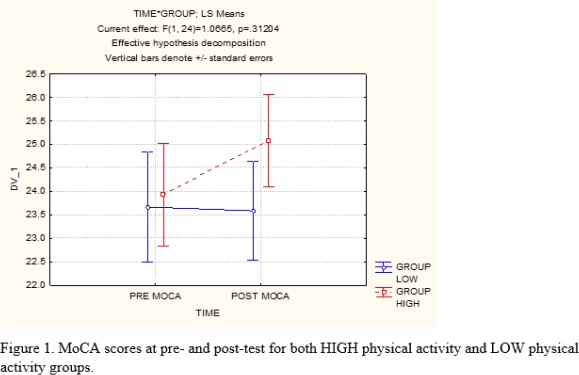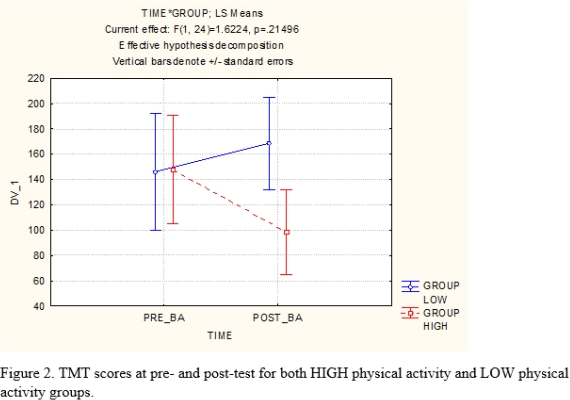Session Information
Date: Wednesday, June 22, 2016
Session Title: Parkinson's disease: Cognition
Session Time: 12:00pm-1:30pm
Location: Exhibit Hall located in Hall B, Level 2
Objective: To determine how physical activity (PA) levels influence disease severity and cognitive function changes as a result of exercise in Parkinson’s disease (PD).
Background: Individuals with PD who exercise regularly have better outcomes in quality of life, and lower disease severity and cognitive decline after a 1-year follow-up (Oguh et al., 2014). Additionally, higher levels of daily PA are associated with greater motor function, which is due to greater integrity of brain structure (Fleishman et al., 2015). The association of daily PA levels and cognitive function have yet to be explored in PD. Furthermore, no studies have investigated whether baseline levels of PA can influence exercise-induced changes in cognitive function and disease severity in PD.
Methods: Twenty-six individuals with idiopathic PD were divided into 2 groups based on baseline PA levels (HIGH & LOW) using the CHAMPS activities questionnaire for older adults. All individuals participated in a 12 week goal-based exercise program for PD. Cognitive function was evaluated with the Montreal Cognitive Assessment (MoCA) and Trail Making test (TMT), and disease severity using the UPDRS-III were assessed pre- and post-exercise.
Results: Both groups were matched in cognitive function and severity, and only caloric expenditure was significantly different between groups at pre-test (p<0.00001). Both groups showed significant severity improvements after exercise (p<0.0001), although no interaction between group and UPDRS, MoCA  or TMT (B-A)
or TMT (B-A)  were found. Importantly, mean clinically relevant changes from pre to post were observed for the HIGH group in both cognitive tests.
were found. Importantly, mean clinically relevant changes from pre to post were observed for the HIGH group in both cognitive tests.
Conclusions: While baseline PA levels do not seem to influence the impact of exercise-induced changes on disease severity, this study showed that the HIGH group had larger changes than the LOW group in cognitive function. These non-significant results may be due to a lack of power from a relatively small sample size, however, they still have potentially important implications. Our findings suggest highly active individuals will have the greatest benefit on cognitive function from exercise. This may be due to PA priming brain neuroplasticity before the onset of treatment. Thus, maintaining a highly active lifestyle may promote better exercise-induced outcomes in cognition for individuals with PD.
To cite this abstract in AMA style:
R. Chow, C.R.A. Silveira, B.N. Intzandt, E. Beck, Q.J. Almeida. Baseline physical activity may influence exercise-induced changes in cognitive function in Parkinson’s disease [abstract]. Mov Disord. 2016; 31 (suppl 2). https://www.mdsabstracts.org/abstract/baseline-physical-activity-may-influence-exercise-induced-changes-in-cognitive-function-in-parkinsons-disease/. Accessed June 30, 2025.« Back to 2016 International Congress
MDS Abstracts - https://www.mdsabstracts.org/abstract/baseline-physical-activity-may-influence-exercise-induced-changes-in-cognitive-function-in-parkinsons-disease/
